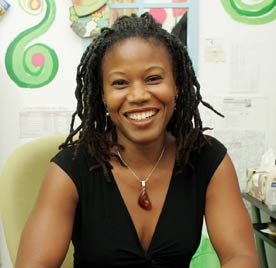A year and a half ago, I returned to Pittsburgh after nearly nine years away from my hometown and encountered a set of problems that drove my curiosity, engagement, and the eventual creation of my current full-time job.
Although huge transformations were taking place in our once steel-driven regional economy, a majority of the existing workforce had not been able to make the shift to adapt to the transitioning economy.
Those transformations had not been embedded in the minds of Americans unfamiliar with Pittsburgh, which remained mired in anachronistic stereotypes of our historic reliance on heavy industry.
And finally, there was a laundry list of urban problems not overtly linked to the decline of industry, but which interfered daily with our ability to make progress: racial segregation; crumbling infrastructure; vacant property; population decline; weak public transit; and local governments crying out for transparency and innovation, to name a few.
Sarah Szurpicki, my long-time friend and now co-conspirator, had also recently returned to her “rustbelt” home of Detroit. I realized after several conversations with her that my hometown was by no means alone, and not just regarding the disconnect between perceptions and reality in Pittsburgh. We had virtually identical laundry lists.
Similarities aside, Detroit and Pittsburgh are of course situated at different points along a broad spectrum of “revival.” In fact, a recent Free Press article argued that Detroit could learn much from Pittsburgh’s successes. But, like it or not, we got here in the same boat. And so did Flint, Buffalo, Minneapolis, and St Louis.
If our collaboration were based merely on the observation of seemingly intractable problems in similarly challenged places, it would have had a much shorter lifespan. It was the tenacity and diversity of the communities we encountered that convinced us to make something happen and asked: “How could we connect them and unleash their collective power on the region? And how can we help to prepare those entering the workforce in growing fields such as biotech and life sciences, advanced manufacturing, freshwater technology, algaeculture, and tire recycling?”
We answered ourselves, coming up with the Great Lakes Urban Exchange, or GLUE, concept almost a year ago — not, as plenty of marketing campaigns have tried and failed to do, to give beleaguered cities a new look, but to tell stories and solve problems.
Plenty has been said about the future of the Rust Belt, also known as the Great Lakes region, by academics and traditional stakeholders in public policy. Yet rarely have 18- to 40-year-olds, often the subject of “brain drain” research and attraction-and-retention efforts, been asked what they view as critical to their cities’ reemergence, or how their experiences in “declining” cities inform that vision.
We’ve spent the past several months traveling to almost two dozen cities in eight states, talking to anyone who’s interested, and identifying citizen journalists to tell city stories and engage in a mega-regional dialogue.
GLUE’s rapidly growing on- and off-line network doesn’t purport to have all the answers to achieving prosperity, but we do believe that those answers are out there, that they apply in some way to us all as part of our shared industrial legacy, and that we are more likely to find them if we compare notes.





Comments